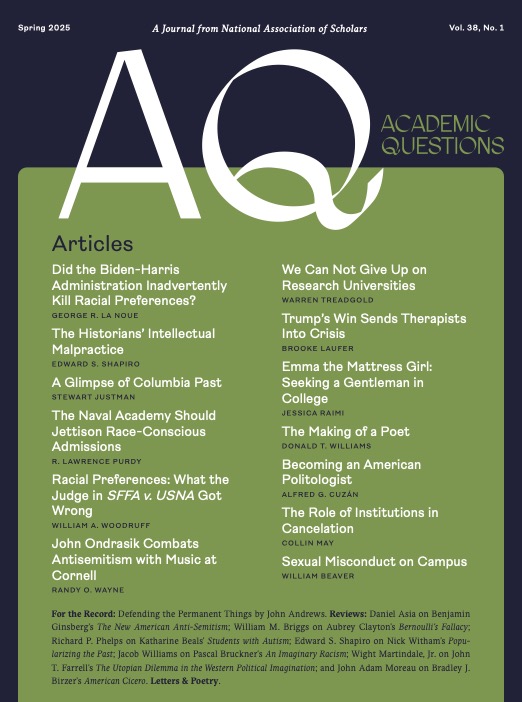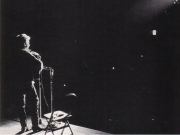What does it take to make a great poet? We seem to have forgotten in the twenty-first century, but history is still there to remind us. At least four things are required: a good eye, a good ear, a good mind, and a good heart.
A Good Eye
First the poet has to have a good eye. He notices things that other people don’t. Take Robert Frost, for example. He (or the persona in his poem) could not rub the strangeness from his eyes as he looked through the pane of glass he skimmed one morning from the drinking trough and held against the world of hoary grass. It melted, and he let it fall and break. But he was well on his way to a poem before it fell, because first he had bothered to look through it and take note of the unique vision it gave him.1 One can notice other things too, like the difference between the way a man and a horse respond to the silence of a wood on a snowy evening2 or the way the yellow leaves sift through the air when you are coming to a fork in the road in the forest.3
The eye here is a synecdoche for all five of the senses. (The synecdoche is a figure of speech where the part stands for the whole, like the Texas rancher who says he has three thousand head of cattle but is actually talking about three thousand whole cows. Maybe that is why Frost defined a poet as a “synecdochist.”4 One can notice sounds too, or smells, or tastes, or tactile physical weights and textures, like Archibald MacLeish pausing over the heft of a globed fruit in the hand and the feel of old medallions to the thumb.5 But you’ve got to notice something. Without a good eye, there is nothing to write about.
A Good Ear
The next thing we have to have is a good ear. A good eye is a necessary but not a sufficient condition for making a poet. By itself, it might make you a journalist or even an essayist, but not a poet. For that, you need to add the ear. This is not now the ear as part of the synecdoche of the eye standing for the five senses, but rather the knack of hearing natural speech rhythms, enjoying them for their own sake, and enlisting their potency to tweak and augment the meaning and force of the words you might use to capture those offerings of the eye. It is best if you also have a sensitivity to the way various formal meters can be used to set up and set off those speech rhythms to add energy and power for the sake of the vision and to add the lyricism and musicality of language for its own sake.
All the great poets of the past could do this. Take Coleridge, who had Alph the sacred river running through caverns measureless to man down to a sunless sea. After a couple lines of sliding effortlessly through the riverbed of iambic tetrameter, you get that dramatic metrical variation “DOWN to a SUNless SEA”: suddenly offering trimeter when you were expecting more tetrameter and smacking you in the face with that startling initial monosyllabic foot, followed by an anapest and an iamb. If you have no idea what I just said, sue your high-school English department for educational malpractice and then just listen to how the river comes to rest at the bottom of its waterfall. “DOWN to a SUNless SEA”: “WHOOSH ditty SPLASH de SPLASH!” And hear how the river spends “five miles meandering with a mazy motion,” with the stresses forcing you to meander from the prevailing meter that had been established just for that purpose.6
That is what those funny words (trimeter, tetrameter, iambic, anapestic, etc.) are for: They are the technical tools of the poet as an artist painting with the rhythms of language, a carpenter building with the boards of heard speech. You need the sensitivity to those speech rhythms that I mentioned, but also training and practice in the formal meters. Almost none of our contemporary “poets” have any of that, which is why we have very few contemporary poets. Most of them are just writing prose arbitrarily fractured, broken up into short lines. And neither they nor their readers can even tell. Which may be one of the reasons why they hardly have any readers anymore. All the competent English poets of the past used meter. The good ones used metrical variation within that prevailing meter to avoid monotony; and the great ones used it to enhance and reinforce the meaning of their words. They had first to establish a meter so they could meaningfully depart from it.
Yes, I know that rhyme is not essential to poetry (see blank verse), and technically meter isn’t either (the Hebrew psalter, free verse). Some free verse does rise to the level of poetry, and much metered verse does not. But leaving meter out of account, as almost all contemporary poetry does, and forgetting about it, as almost all contemporary instruction in poetry does, is not a good move. Imagine a carpenter who was highly skilled with the hammer but could not use a saw. Is he still a carpenter? I suppose. A good one? Doubtful. An ideal or even a proficient one? No way. So, yes, meter, rhyme, alliteration, assonance, consonance, they all need to be restored, put back in the toolbox.
A Good Mind
We have run into another necessary but not sufficient condition. If you don’t know how to use meter, you are barely a poet at all (if at all); if you do but that is all you have, you are only a versifier, not a poet. The poet has the eyeand the ear … and a good mind to boot. The eye lets you notice things, and the ear lets you express them lyrically. The mind lets you notice, not just things, but connections between things.
So Frost noticed not just how two roads diverge in a yellow wood and how taking the less-traveled path makes a difference, but how this is like the way decisions come at you in life. He saw not just how peaceful a wood can be on a snowy evening but how the limits imposed on us by our obligations make that experience fleeting, and how that fleetingness makes it strangely and ironically richer and more precious—as if the law of supply and demand were more than just a dry theorem of economics. Thus, his poem becomes a picture, not just of the wood itself, but also of the very quality of life lived in time by the finite.
Frost wisely only hints at these meanings and applications, leaving you to discover them for yourself if you can. Why? Because making them too explicit would be way less fun, not to mention turning the poem into a lecture. Poetry is, after all, he realized, the one permissible way to say one thing and mean another.7 That is really why he called the poet a synecdochist: He is taking some little slice of human experience and letting us not only see it but see it as part of the bigger picture that gives it its meaning. Frost was using the word synecdoche as a synecdoche (see what he did there?) for figurative language as a whole—metaphor, simile, hyperbole, irony, symbolism. Clever devil, he was—showing us, not just telling us, how to combine a good eye with a good ear and a good mind. Now we are really starting to build a poet.
A Good Heart
There is one last component that we need to put in place. The ideal poet needs a good eye, a good ear, a good mind—and a good heart. Having the skills provided by the first three components is a wonderful thing; but by themselves they do not make you any wiser than any of the other less gifted mortals. So you could be a talented writer like Ovid, who “lisped in numbers, for the numbers came” while treating sex as just another recreational drug in his infamous poem “The Art of Love” (the Joy of Sex of ancient Rome).8 He was so risqué that he got himself banned from the decadence of imperial Rome, if you can imagine such a thing. Modern poets like Baudelaire or Swinburne continue that tradition. It will undoubtedly be with us as long as human beings are fallen and imperfect. But there is no need for you or me to contribute to it.
The greatest poets, the ones that nurture our souls, have good eyes, good ears, good minds, and good hearts as well—not perfect or unflawed hearts, because they are human beings after all, but good ones, by special or common grace, each in some limited way. Once again, when it shows up in their poems, that goodness or wisdom should be hinted at, not baldly stated. We don’t want to turn the poem into a sermon any more than a lecture. Lectures and sermons are fine things, and I have filled the world with many specimens of both. (This essay is a bit of a lecture, isn’t it?) But lectures and sermons are not poems. Lectures and sermons try to be clear, while poems try to be suggestive. They each have their own virtue and their own contribution to make. What kinds of suggestive wisdom has been contributed by poetry?
The Great Poets
That suggestive wisdom includes Homer, showing us how little the human condition has changed in three millennia: Despite many advances in technology, hubris still keeps us from achieving our goals or enjoying our achievements (The Iliad), but love can still make life worth living (The Odyssey). It includes Virgil, showing us how hard a thing it was to build the Roman Empire, the virtue and dedication it would have taken to build it well, and (unintentionally) the tragedy of those who expended that virtue and dedication on a cause that could not persevere in deserving it, as the virtue of the Republic descended horribly soon after Virgil’s life into the corruption of Nero and Caligula. It includes Tennyson, showing us (intentionally) the same thing in the kingdom of Arthur. It includes Wordsworth, showing us the way the beauty of nature can speak to the hunger for transcendence in us (though ultimately failing to trace it, in his poems, all the way back to its source). It includes Frost, doing a similar thing in a more folksy American mode.
These and a host of others are why we should value the combination of eye, ear, mind, and heart wherever we can find it. They are why we should preserve it from the past, introduce it to the present, and send it on into the future. They are why we should lament the loss of the very capacity or even the will to provide the means of spotting and appreciating it in our educational system and why we should devote our lives to restoring them.9 They are why you should put this essay down right now and go read a good poem.10
I wish you joy in it!
Donald T. Williams is Professor Emeritus of Toccoa Falls College in the hills of northeast Georgia. A border dweller, Williams stays permanently camped out on the borders between theology and literature, serious scholarship and pastoral ministry, Narnia and Middle-Earth. He is the author of fifteen books, including Stars through the Clouds: The Collected Poetry of Donald T. Williams (Lantern Hollow Press, 2020). His website is www.donaldtwilliams.com. He blogs at www.thefivepilgrims.com. Williams last appeared in AQ with “Social Justice” in our summer 2024 issue.
1 Robert Frost, “After Apple Picking,” The Poetry of Robert Frost, ed. Edward Connery Lathem (NY: Rhinehart, and Winston, 1969), 68-9.
2 Frost, “Stopping by a Wood on a Snowy Evening,” The Poetry of Robert Frost, 224-5.
3 Frost, “The Road not Taken,” The Poetry of Robert Frost, 105.
4 E.g., at a poetry reading at Mount Holyoke College on Feb. 13, 1931, as recorded in Elizabeth Shepley Sergeant, Robert Frost: The Trial by Existence (NY: Holt, Rinehart, and Wilson, 1960), 325.
5 Archibald MacLeish, “Ars Poetica,” The Collected Poems of Archibald MacLeish (Boston: Houghton Mifflin, 1962), 50-51.
6 Samuel Taylor Coleridge, “Kubla Khan,” English Romantic Poetry and Prose, ed. Russell Noyes (NY: Oxford Univ. Press, 1956), 391-2.
7 Robert Frost, Selected Prose of Robert Frost, ed. Hyde Cox and Edward Connery Lathem (NY: Collier, 1956), 24.
8 Ovid: The Art of Love and Other Poems, with an English Translation by J. H. Mozley, The Loeb Classical Library (Cambridge, MA: Harvard Univ. Pr., 1979).
9 For more on the nature and value of poetry, see the author’s essays “Poetry” and “Old Possum’s Book of Practical Poets: T. S. Eliot and C. S. Lewis,” in Donald T. Williams, Inklings of Reality: Essays toward a Christian Philosophy of Letters, 2nd ed. (Lynchburg: Lantern Hollow Press, 2012), 173-204.
10 For attempts to provide some, see Donald T. Williams, Stars through the Clouds: The Collected Poetry of Donald T. Williams (Lynchburg: Lantern Hollow Press, 2020).
Photo by Pierre Bamin on Unsplash














